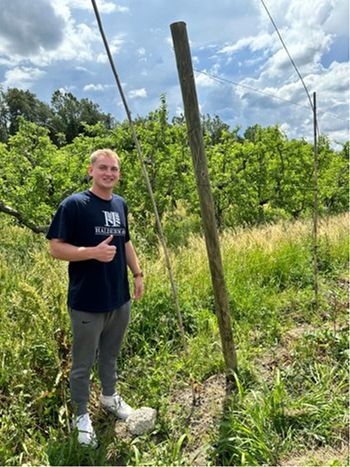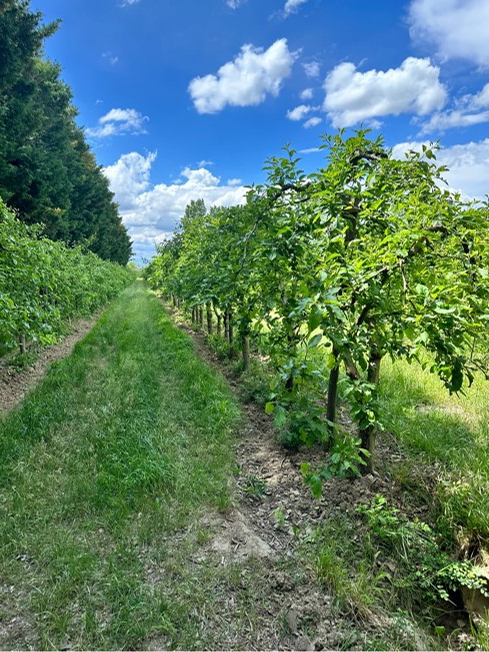A Taste Of France!
By Jason Johnloz
 My name is Jason Johnloz, and I will be an upcoming senior at Purdue University this fall, majoring in farm management with a minor in crop science. I was given the opportunity to study abroad for ten days through Purdue’s College of Agriculture in a program called “A Taste of France.” We visited Monaco, Lyon, Nice, Provence, and Paris during our time abroad. The program focused on teaching us about local agricultural practices, small-scale sustainable food production, food marketing, and international competition.
My name is Jason Johnloz, and I will be an upcoming senior at Purdue University this fall, majoring in farm management with a minor in crop science. I was given the opportunity to study abroad for ten days through Purdue’s College of Agriculture in a program called “A Taste of France.” We visited Monaco, Lyon, Nice, Provence, and Paris during our time abroad. The program focused on teaching us about local agricultural practices, small-scale sustainable food production, food marketing, and international competition.
During one of the days we spent in Provence, we had the opportunity to visit an organic apple orchard. Gaining a new perspective on European farming compared to the typical corn and soybean row crops, like I am used to in northeast Indiana. I am thrilled to share all that I learned, and hopefully, you find it as fascinating as I did!
Charlotte, a second-generation farmer in Provence, France, was generous enough to give us the full tour of her 3.5-hectare (8.6 acres) organic apple tree farm that she inherited and took over in 2015. Prior to 2015, before she took charge of the complete operation, they were not entirely organic. But, to our surprise, being organic does not stop her from cooking up her own concoctions to spray on her apples to keep the insects and pests off so that she can attain max yield out of her apples. She uses two different types of plants: oxalis and comfrey; she boils them down in a small 5-gallon propane-powered tank and uses that mixture to spray on all her apples. The oxalis is used as a fungicide and repels aphids, and the comfrey is used as an insecticide. 
To combat the droughts in southern France, Charlotte’s irrigation system is much different than anything I have ever seen before. A small canal was dug onto her property that takes water straight from the Alps mountains and can be controlled by small dams she has put in place. Once a month, Charlotte floods almost the entire orchard, supplying enough moisture to withstand the droughts. Typically, she says it takes about one full day to flood the orchard. This is quite different from the regular pivot system irrigation you might see on fields while driving through Indiana. However, that’s one more thing unique to maintaining a different type of crop in a completely different country.
 Charlotte raises multiple varieties of apples on her farm for two different reasons. One of these is that she can harvest them at different times during the year because of how long it takes them to grow, providing her with a more extended income throughout the year. The second reason is that she can keep her customers happy by providing them with different varieties of apples to choose from “so their taste buds don’t get bored!” From the raised apples, they also produce over 8,000 bottles of apple juice each year that they bottle and package themselves. They let us sample some of their juice; it was the best glass of apple juice I’ve ever tasted! They are nothing short of hard work at the farm, considering they hand-pick all their apples to avoid damaging them and keep their appealing beauty and color.
Charlotte raises multiple varieties of apples on her farm for two different reasons. One of these is that she can harvest them at different times during the year because of how long it takes them to grow, providing her with a more extended income throughout the year. The second reason is that she can keep her customers happy by providing them with different varieties of apples to choose from “so their taste buds don’t get bored!” From the raised apples, they also produce over 8,000 bottles of apple juice each year that they bottle and package themselves. They let us sample some of their juice; it was the best glass of apple juice I’ve ever tasted! They are nothing short of hard work at the farm, considering they hand-pick all their apples to avoid damaging them and keep their appealing beauty and color.
 This trip was one of the most incredible opportunities I have ever been able to be part of, and I am beyond grateful to Purdue and the College of Agriculture for providing students with the chance to participate. I’m honored to share with the clients and staff of Halderman just a hint of the experience that I was blessed with, and hopefully, you were able to take something away from this blog post.
This trip was one of the most incredible opportunities I have ever been able to be part of, and I am beyond grateful to Purdue and the College of Agriculture for providing students with the chance to participate. I’m honored to share with the clients and staff of Halderman just a hint of the experience that I was blessed with, and hopefully, you were able to take something away from this blog post.
